GIORGIO KOUKL | 30 JUL 2021
Carl Gustav Jung, the Swiss psychoanalyst defined the twelve archetypes at the beginning of the 20th century. As he defined them: “These archetypes are imprinted and hardwired into our psyches.” Trying to define these entities by musical means is an interesting idea.
Uniting three musical concepts like this of Third Coast Percussion, Sèrgio Assad and his daughter Clarice Assad is either a great chance for obtaining exceptional musical results or a big danger of mixing together the impossible. Let us analyze how things went.
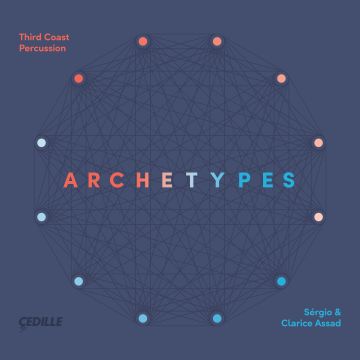
“Archetypes”
Third Coast Percussion, Sérgio Assad & Clarice Assad
Release: January 15, 2021
Label: Cedille
CDR 90000 201
Archetypes is a Cedille release and the first thing emerging is a great care for every single detail. The work of the sound engineers is outstanding, the post recording processes are very smooth and well chosen, the press release material is of outstanding quality.
But all this would be just a nice empty box without the musical content. So let’s examine the both aspects of the music, composition and performance. First of all the performers are really of high standard, no doubt about this.
Listening to the Third Coast Percussion alone playing, for example, the music of Steve Reich is of enough convincing power to know that these four young men can achieve practically anything from the technical point of view. What seems so easy is surely a long process of perfection, endless hours of practicing until a point is reached where everything seems easy even if it is not at all. Few ensembles today can display this quality, so a Grammy is surely a logical consequence and well merited.
Clarice Assad is a multi-talent, she plays piano, sings and is even composing music which I logically listened to with great curiosity. Well, her singing, with all the vocal techniques she is able to display and which she uses also in the few tracks of the CD is the most original and appealing of all her abilities.
Sèrgio Assad, a well known Brasilian guitarist, is firmly rooted in the folk tradition of his native country. Playing often in a guitar duo with his brother Odair, he enlarged with many original compositions and arrangements the repertoire for such a formation.
The first track, called Rebel, composed by Ms. Assad, is a fine example of what is coming next. The music is energetic, has a nice feeling of jazz, which the sound of non acoustic piano underlines further and contains some examples of voice technique mentioned before. The score is partly improvised, but the passages between written and not written are seamless and well made.
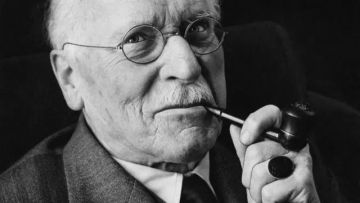
Swiss psychiatrist Carl Gustav Jung, founder of analytical psychology.
In the second track, Innocent, composed by Sèrgio Assad, we can follow a sort of duet with his daughter Clarice. The music is convincing, simple and straightforward.
Mr. Assad is also the composer of the next track, Orphan. The traditional use of harmony, until now a little oppressively omnipresent, is here more free, venturing into quite untraditional solutions, which finally emerge from what has been some too often repeated pattern, already heard in so many other CDS.
David Skidmore, member of the Third Coast Percussion, is the composer of Lover. This is by far the most interesting composition of the whole CD. The constant semitone shifts create a magical atmosphere, a really brilliant solution what to do with minimalism without being boring.
Next comes Magician, another work of Mr. Assad. Despite its rhythmical cascades of notes and the dialogue between the guitar and vibraphone the music stays within the borders of already overused material and really lacks a sparkling moment.
Track number six, called Ruler, composed by Peter Martin. Melancholic, with a certain dignity of calm, combines the impossible duo of guitar and piano. Here I really badly missed the sound of a real piano, especially considered that the whole five minutes are a single great crescendo, where the percussion slowly take over and transform the simple melody into a more dramatic affair. Surely an interesting idea.
The next archetype, Jester, written by Clarice Assad, starts with a solo instrument we here in Europe would call “scacciapensieri,” a typically Sicilian small gadget. The work tries hardly to be funny, but fails to really describe a real jester, maybe irreverent but entertaining. Even the strange sound at the end of this work seems disconnected.
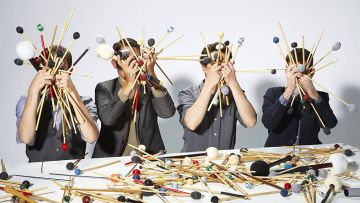
Third Coast Percussion (credit: Saverio Truglia)
Caregiver, just another work of Ms. Assad is firmly rooted in a certain relaxing South American music you would expect to hear in a beach bar just in time for a sunset and a cocktail. Pleasant and caressing.
Track number nine, the Sage, written by Robert Dillon, begins with a nice, dramatic, low, dissonant chord of a piano. This sage seems not to be an old, good and gentle man, but slightly creepy as the strange small glissandi underlines. At a certain point a whispering voice is briefly heard, a nice touch which would deserve to be used more extensively. Probably a track which required all the post production magics to obtain such a result. A very good composition, indeed.
Sean Connors is the composer of track number 10, entitled Creator. A nice try to use a small eight-note cell, varying all the possibilities, juxtaposing and deconstructing the material at every passage. The piece becomes really intriguing only in the second part. Unfortunately the ending of such an essay is always a problem. In this case, too the final solution is not so satisfactory.
Then comes Clarice Assad again with probably her best contribution to the CD, Hero. Energetic, with a clear line in mind, it is convincing right from the beginning.
The final track, called Explorer, is a work of Sèrgio Assad. It displays its deliciously “retro” flair, even with a nice percussion roll for the finale.
Considering the effort put in place for this production this is certainly a good CD to listened to. A little remark would be that it does not showcase the abilities of the percussionists to the degree they surely would be able to deliver. On the other hand, all the musicians certainly were able to merge their talents into a common idea, which, and this can be heard in every single piece, was clearly satisfactory and a great fun for them. ■
RECENT POSTS


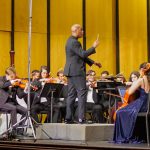

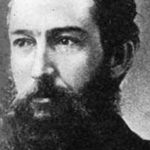
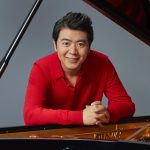

.png)